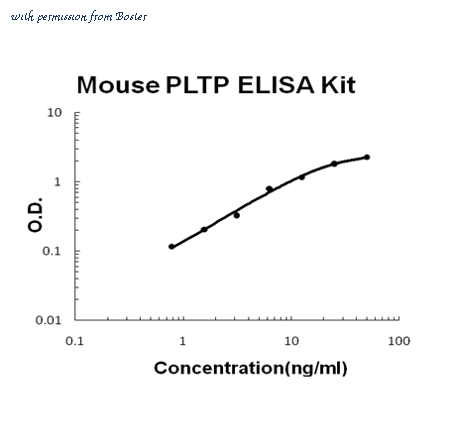product summary
Loading...
company name :
Boster
product type :
ELISA/assay
product name :
Mouse PLTP ELISA Kit PicoKine®
catalog :
EK1368
quantity :
96 wells/kit, with removable strips.
price :
369 USD
more info or order :
image
image 1 :

Mouse PLTP PicoKine ELISA Kit standard curve
product information
SKU :
EK1368
Product Name :
Mouse PLTP ELISA Kit PicoKine®
Size :
96 wells/kit, with removable strips.
Price :
369 USD
Description :
Mouse PLTP ELISA Kit PicoKine® (96 Tests). Quantitate Mouse Pltp in cell culture supernatants, cell lysates, serum and plasma (heparin, EDTA). Sensitivity: 20pg/ml.
Reactivity :
Mouse
Application :
ELISA
Gene Name :
PLTP
Uniprot ID :
P55065
Immunogen :
Expression system for standard: NS0; Immunogen sequence: E18-A493
Cross-reactivity :
There is no detectable cross-reactivity with other relevant proteins.
Assay Range :
0.78 ng/ml - 50 ng/ml
Sensitivity :
<20 pg/ml
Sample Type :
cell culture supernatants, cell lysates, serum and plasma (heparin, EDTA)
Capture/Detection Antibodies :
monoclonal antibody from rat, polyclonal antibody from goat
Storage :
Store at 4°C for 6 months, at -20°C for 12 months. Avoid multiple freeze-thaw cycles (Ships with gel ice, can store for up to 3 days in room temperature. Freeze upon receiving.)
Gene Full Name :
Phospholipid transfer protein
Synonyms :
Phospholipid transfer protein;Lipid transfer protein II;Pltp;
Protein Name :
Phospholipid transfer protein
Molecular Weight :
54453 MW
Protein Function :
Facilitates the transfer of a spectrum of different lipid molecules, including diacylglycerol, phosphatidic acid, sphingomyelin, phosphatidylcholine, phosphatidylglycerol, cerebroside and phosphatidyl ethanolamine. Essential for the transfer of excess surface lipids from triglyceride-rich lipoproteins to HDL, thereby facilitating the formation of smaller lipoprotein remnants, contributing to the formation of LDL, and assisting in the maturation of HDL particles. PLTP also plays a key role in the uptake of cholesterol from peripheral cells and tissues that is subsequently transported to the liver for degradation and excretion. Two distinct forms of PLTP exist in plasma: an active form that can transfer PC from phospholipid vesicles to high-density lipoproteins (HDL), and an inactive form that lacks this capability (By similarity).
Subcellular Localization :
Secreted.
Tissue Specificity :
Highest in lung, adipose tissue, brain, and heart.
Background :
Phospholipid transfer protein (PLTP), also known as lipid transfer protein II is a protein that in humans is encoded by the PLTP gene. This gene is mapped to 20q13.12. The protein encoded by this gene is one of at least two lipid transfer proteins found in human plasma. The encoded protein transfers phospholipids from triglyceride-rich lipoproteins to high density lipoprotein (HDL). In addition to regulating the size of HDL particles, this protein may be involved in cholesterol metabolism. At least two transcript variants encoding different isoforms have been found for this gene.
Research Category :
Atherosclerosis, Cancer, Cancer Metabolism, Cardiovascular, Cholesterol Metabolism, Heart Disease, Lipid And Lipoprotein Metabolism, Lipid Metabolism, Lipids / Lipoproteins, Metabolic Signaling Pathway, Metabolic Signaling Pathways, Metabolism, Metabolism Of Lipids And Lipoproteins, Pathways And Processes, Serum Proteins, Signal Transduction
more info or order :
company information

Boster
3942 B Valley Ave
Pleasanton, CA 94566
Pleasanton, CA 94566
boster@bosterbio.com
https://www.bosterbio.com925.485.4527
headquarters: USA
Premium Provider of Antibodies and ELISA Kits
